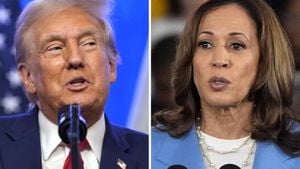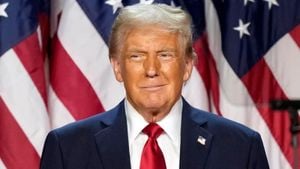Donald Trump’s re-election is poised to usher in significant shifts for businesses and the economy, driven by both his administration's policies and the dynamics within Congress. Experts from the Darden School of Business have shared insights on what this new political climate could mean for various economic factors.
Among the pressing issues is inflation, addressed by Rodney Sullivan, Executive Director for the Richard A. Mayo Center for Asset Management. Sullivan highlights how inflation, which appeared to be declining, may face renewed threats due to the combination of aggressive fiscal policies and interest rate adjustments by the Federal Reserve. He points out the potential for expansive tax cuts targeting both corporations and households under Trump’s leadership, which, if not balanced by cuts to spending, could dangerously widen the fiscal deficit.
Trump's administration is also known for its trade policies, which aim to lessen trade deficits and promote domestic manufacturing. While this may achieve intended results, Sullivan warns it could provoke retaliation from other nations, igniting trade conflicts and triggering inflationary pressures. This scenario, alongside lower tax rates and increased import tariffs, sets the stage for what he calls "echo-inflation"—a resurgence of unexpected inflationary trends.
Despite these challenges, Sullivan observes some positives: the current U.S. economy remains resilient, buoyed by productivity gains stemming from advancements like artificial intelligence. This resilience could present structural support for economic growth even amid inflationary concerns.
For investors, Sullivan advises caution and diversification, particularly as stock and bond markets react to the new pro-business climate created by Trump’s policies. While equities might flourish, the bond market remains sensitive, showing signs of rising yields due to pressures from anticipated budget deficits. Therefore, he promotes including inflation-protected securities like Treasury Inflation-Protected Securities (TIPS), real estate, commodities, and stocks within investment portfolios to cushion against unexpected inflation spikes.
Switching gears, the significance of corporate communications during this period of transition cannot be overstated. Steve Soltis, another Darden lecturer, emphasizes how businesses are largely not caught off guard by the election outcome. Many corporations have already devised scenarios considering different election results. Their strategic communications will now focus on showcasing resilience and adaptability to both clients and investors.
Soltis notes the buzz around how large enterprises will showcase their capacity to navigate this new administrative framework, especially those within healthcare, energy, and technology sectors. CEOs are proactively sending out communications to employees, assuring them of the company's alignment with core values, including diversity and sustainability.
On the global stage, the ramifications of Trump’s re-election extend beyond U.S. borders. Former BHP economist Huw McKay suggests potential consequences for global trade dynamics, particularly between the U.S. and China. McKay asserts Trump’s foreign policies could rekindle tensions between these economic giants. A trade war might not simply harm bilateral trade but could also disrupt global supply chains and impact commodities markets.
Looking closer, McKay references the traditional economic perspective: China’s economic slowdown could lead to decreased demand for Australian resources like iron ore and coal. This, he suggests, could create ripples throughout the Australian economy, making it vulnerable to global shifts instigated by U.S.-China relations.
Yet, observing the current global commodities market, McKay remains cautious yet hopeful. The potential for newly negotiated trade agreements under Trump may help stabilize trade flows and protect Australian suppliers, provided the negotiations yield favorable terms.
Instances of trade disagreements have already emerged, reflecting uncertainties within the market. Prices for commodities such as copper, aluminum, and iron ore have fluctuated as stakeholders await clarity on the new administration's approach to trade and tariffs. These shifts could signal broader economic adjustments as businesses recalibrate their strategies for engaging both U.S. and international markets.
Adding to Mr. McKay’s points, some analysts believe Trump's tax policies may incentivize companies to repatriate foreign earnings. CEOs might see this as an opportunity to invest domestically, fostering growth amid new tax structures. Overall, this could benefit U.S. workers, influence job creation efforts, and potentially lead to wage increases, but it hinges heavily on the execution of those tax and economic policies.
While businesses prepare for what lies ahead, they recognize the importance of being adaptable. The prevailing sentiment among leading corporate figures is one of strategic optimism; awareness of the potential upheaval demands agile responses and preemptive planning. With global markets remaining interconnected, U.S. policies under Trump will reverberate beyond domestic borders, influencing trade relationships and the broader economic atmosphere.
At the same time, observers must remain vigilant about the socio-political climate. The stark divide between voters and the potential for civil unrest could create additional volatility as Trump's second term progresses. Bridging gaps between differing economic philosophies and regional interests will challenge both political and business leaders.
Current economic indicators suggest uncertainty, but resilience exists. Economists maintain cautious optimism, supported by the dynamic reactions of both financial markets and business practices as they adapt to new realities.
Trump's tactics may have alarming aspects; nevertheless, the enthusiasm among business leaders about pro-growth policies indicates the possibility of sustained recovery from past economic traumas. The collective response, grounded in strategic foresight and adaptability, remains the key to thriving amid the unpredictability of this impending change.
Whether it’s through enhancing communication strategies or revising investment plans, the shared theme is clear: preparedness will be integral to success as the U.S. transitions under Trump's renewed banner.



